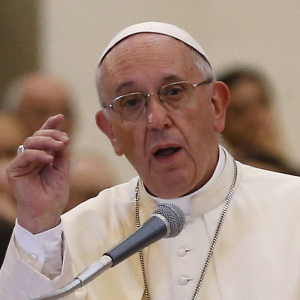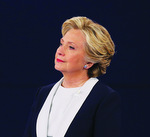Although Republicans have recently championed the religious liberty issue, Hillary Clinton (above) was the only one to address the question in the second presidential debate last Sunday with Republican contender Donald Trump. In response to a question about Syrian refugees, the Democratic candidate said: “It is important for us as a policy not to say, as Donald has said, we’re going to ban people based on a religion. How do you do that? We are a country founded on religious freedom and liberty. How do we do what he has advocated without causing great distress within our own county? Are we going to have religious tests when people fly into our country?” In a policy which he said was designed to prevent potential terrorists from entering the country, Mr Trump has called for a “total and complete shutdown” of the US borders to Muslims.
In a discussion of the Supreme Court, Mrs Clinton reiterated her support for the 1973 decision that established women’s rights to abortion. Mr Trump said he would nominate Supreme Court nominees in the mould of Antonin Scalia, the Catholic Associate Justice of the Supreme Court who died in February this year.
An Argentinian priest who had spoken out against drug trafficking was found dead in the northern city of San Miguel de Tucuman on 5 October. Fr Juan Heraldo Viroche, 46, had received multiple death threats after denouncing the drug trade in his homilies. His body was found hanged in his presbytery. Sustained threats against him led Fr Viroche to seek a transfer, which had been authorised. However, he delayed moving, wanting to finish a novena he had started in the community, according to Archbishop Alfredo Horacio Zecca of Tucumán. The Archdiocese issued a statement expressing “trust in the action of the justice system” while the bishops’ conference voiced its “sorrow and dismay over the death” and sought a “prompt clarification of the facts”.
Peace lessons
Timor-Leste’s government has applauded a Catholic programme to prioritise peace education in schools, which aims to help society to recover from the trauma of years of war. Luis Manuel Fernandes, Director-General of Secondary Education at the Ministry of Education, said last week that the country must cultivate ways of raising young people to be good citizens. One beacon school is the Franciscan school in Same district. Its principal, Franciscan Fr Sebastianus Gaguk, told more than 200 high school teachers taking part in a training session in Dili earlier this year: “You should spend 5-10 minutes every day teaching them moral values and ethics and it will help them become better people in society”. The former East Timor in South-East Asia became a sovereign nation in 2002 after decades of conflict.
Belgian bishop Johan Bonny of Antwerp has suggested that homosexual couples, divorced and remarried Catholics and people who are cohabiting should be given some sort of Church blessing as part of a “diversity of rituals” that would recognise the “exclusiveness and stability” of their unions. In a book published this week, Bishop Bonny argues that the Church should engage with all couples “in loving relationships”. Since the 2014 and 2015 Synods on the Family and the apostolic exhortation published in April this year, Amoris Laetitia, this is one of the most radical viewpoints to have been expressed by a Catholic bishop in the name of “pastoral care” and “mercy”. His book was published on 11 October under the title May I? Thank you. Sorry, a quote from Pope Francis’ frequent talks to married couples, highlighting Francis’ view of the most important words in a relationship. “There is no way we can continue to claim that there can be no other forms of love than heterosexual marriage,” Bishop Bonny says.
Catholic bishops in The Philippines are supporting plans to take “a different path” to address the issue of drugs at national level, without resorting to “state violence”. This means an alternative strategy to that of President Rodrigo Duterte, whose crackdown on drug traffickers and dealers since his election in May has led to a sharp increase in extra-judicial killings by police and paramilitary groups. The Church is calling for collaboration between state and civil society on drug addicts’ rehabilitation programmes, accompanying drug dealers and addicts on a path to recovery and social reintegration. It is estimated that at least 3,700 people have been killed during President Duterte’s first 100 days in office. “The number of victims is approaching the figure of 4,000 deaths during the 20 years of martial law,” reflected Bishop Antonio Tobias of Novaliches last week. He reported that a “peace zone” will be created in his diocese with programmes of rehabilitation.
The prominent Australian Jesuit, human rights advocate and law professor Fr Frank Brennan has been appointed Chief Executive Officer of Catholic Social Services Australia (CSSA).
Fr Brennan SJ will lead an organisation that represents a national network of 53 Catholic social-service providers throughout Australia in areas including assisting women and children escape family violence, housing and homelessness support, and mental health and disability services. Church agencies that are part of CSSA also work in partnership with and for Indigenous people and offer support and services to asylum-seekers and refugees.
Following the rejection of the peace deal agreed between the Colombian Government and FARC rebels in the 2 October referendum, the Catholic Church has expressed the need to continue working towards peace and clarified that the visit of Pope Francis scheduled for early next year is not predicated on the peace deal. President Juan Manuel Santos (above) was awarded the Nobel Peace Price on 7 October, in recognition of his work to broker the deal. While the award came shortly after the “No” vote, the Nobel committee said the vote does not mean Colombians are opposed to peace. Mr Santos said he would donate the 800,000 euros in prize money to the victims of the 52-year armed conflict. Luis Augusto Castro, Archbishop of Tunja and bishops’ conference president, said more dialogue was needed: “Many Colombians voted ‘No’ ... because they want a better peace that doesn’t give as many concessions to the guerrillas.” The papal visit that Mr Santos announced before the vote is not “conditional” on the peace process, he said.
13 October 2016, The Tablet
News Briefing: The Church in the World
 Loading ...
Loading ...
Get Instant Access
Subscribe to The Tablet for just £7.99
Subscribe today to take advantage of our introductory offers and enjoy 30 days' access for just £7.99



